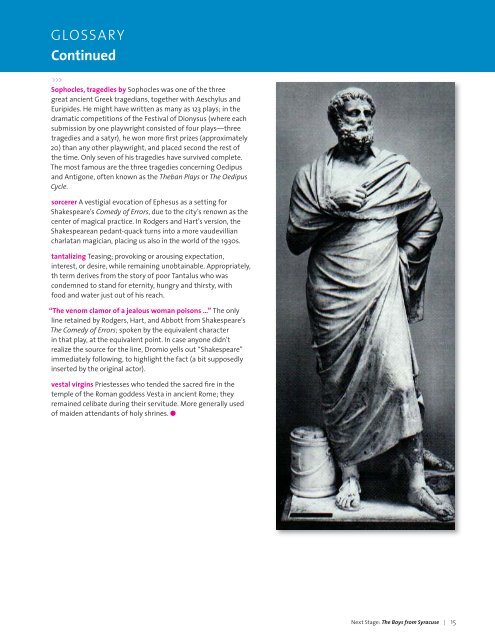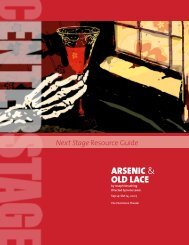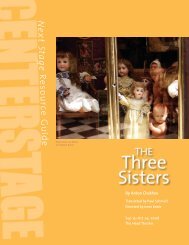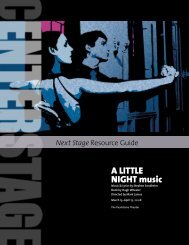The Boys from Syracuse - Center Stage
The Boys from Syracuse - Center Stage
The Boys from Syracuse - Center Stage
- No tags were found...
You also want an ePaper? Increase the reach of your titles
YUMPU automatically turns print PDFs into web optimized ePapers that Google loves.
GLOSSARYContinued>>>Sophocles, tragedies by Sophocles was one of the threegreat ancient Greek tragedians, together with Aeschylus andEuripides. He might have written as many as 123 plays; in thedramatic competitions of the Festival of Dionysus (where eachsubmission by one playwright consisted of four plays—threetragedies and a satyr), he won more first prizes (approximately20) than any other playwright, and placed second the rest ofthe time. Only seven of his tragedies have survived complete.<strong>The</strong> most famous are the three tragedies concerning Oedipusand Antigone, often known as the <strong>The</strong>ban Plays or <strong>The</strong> OedipusCycle.sorcerer A vestigial evocation of Ephesus as a setting forShakespeare’s Comedy of Errors, due to the city’s renown as thecenter of magical practice. In Rodgers and Hart’s version, theShakespearean pedant-quack turns into a more vaudevilliancharlatan magician, placing us also in the world of the 1930s.tantalizing Teasing; provoking or arousing expectation,interest, or desire, while remaining unobtainable. Appropriately,th term derives <strong>from</strong> the story of poor Tantalus who wascondemned to stand for eternity, hungry and thirsty, withfood and water just out of his reach.“<strong>The</strong> venom clamor of a jealous woman poisons …” <strong>The</strong> onlyline retained by Rodgers, Hart, and Abbott <strong>from</strong> Shakespeare’s<strong>The</strong> Comedy of Errors; spoken by the equivalent characterin that play, at the equivalent point. In case anyone didn’trealize the source for the line, Dromio yells out “Shakespeare”immediately following, to highlight the fact (a bit supposedlyinserted by the original actor).vestal virgins Priestesses who tended the sacred fire in thetemple of the Roman goddess Vesta in ancient Rome; theyremained celibate during their servitude. More generally usedof maiden attendants of holy shrines. ●Next <strong>Stage</strong>: <strong>The</strong> <strong>Boys</strong> <strong>from</strong> <strong>Syracuse</strong> | 15









